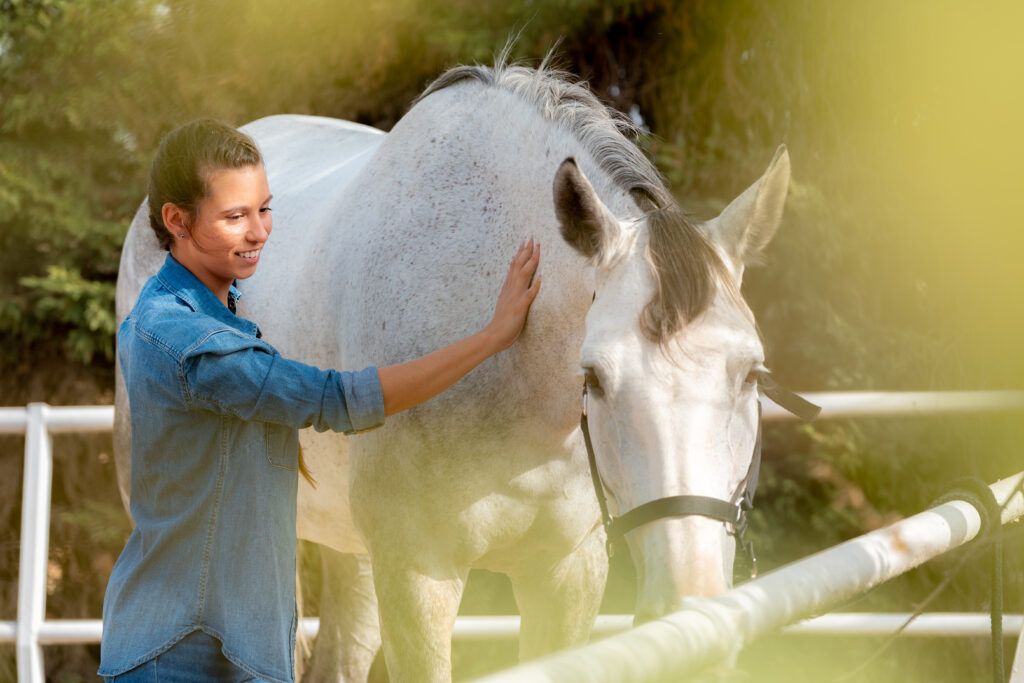
The Oxford Dictionary defines confidence as “a feeling of self-assurance arising from one’s appreciation of one’s own abilities or qualities.” Many veterinarians and other professionals suffer from Impostor Syndrome, defined as “the persistent inability to believe that one’s success is deserved or has been legitimately achieved as a result of one’s own efforts or skills.” Lack of confidence can have many negative effects in one’s personal and professional life, especially in equine practice.
Signs of Lack of Confidence
People who lack confidence are often highly critical of themselves. They may diminish their positive qualities, feel inferior to their peers, use negative words to describe themselves, tend toward negative self-talk, and blame themselves for things that go wrong rather than considering the factors that are out of their control. They may have consistent feelings of self-doubt, be overly sensitive to criticism, and feel unappreciated. Their behavior may be passive or passive aggressive. Sound familiar? Sadly, many veterinarians are suffering a crisis of confidence. This may be fueled by social media criticism, clients that have impossible expectations, exhaustion, or the inevitable missteps that accompany practice.
Consequences of Low Self-Esteem
Research on self-esteem has shown that low confidence is associated with anxiety, depression, stress, and even suicidal thoughts. With veterinary medicine having a higher rate of suicide than many professions, gaining self-assurance can be a powerful tool. Low confidence may also result in people treating themselves poorly or allowing other people to do so. It can contribute to unhealthy choices or withdrawal. Increased cynicism, decreased adaptability, and poor decision-making can make workplace functioning suffer.
Confidence in Equine Practice
According to Dr. Dave Nichol, author of So You’re a Vet…Now What, lack of confidence in new graduates can be caused by a mismatch in employers’ expectations and graduates’ readiness to enter the field. This may result from changes in veterinary medical education (for example, teaching with models rather than live animals) and the increased amount of knowledge students must learn. New practitioners will also meet clients with high expectations who gather knowledge of varied accuracy from the internet. In addition, mistakes come at a high cost. “At the very worst, a critical mistake could cause an animal significant harm. At best, it can cause a lot of embarrassment. This can be really discouraging and cause a great deal of anxiety. Add in the fear of client power on social media, and you have a recipe for avoidance of risk,” says Dr. Nichol.
How to Regain Confidence as an Equine Practitioner
Gaining or regaining confidence in equine practice can be successful with an intentional approach. One of the most important steps is training your inner voice to be as kind to you as it would be to your best friend under similar circumstances. Listen carefully for that voice to undermine you, and then correct it out loud. If it says, “You shouldn’t try to do that procedure. You don’t know what you’re doing,” respond with, “I’m a licensed, graduate veterinarian, and I’m capable of this procedure, which I studied thoroughly last night. It’s going to be fine, and I will ask for help if I find I need it.”
In addition, avoid social media, use your mentors and trusted colleagues as supporters and teachers, develop appropriate boundaries, and stretch yourself in activities outside the workplace. Recognize that mistakes and misdiagnoses are real parts of medical practice because no one is perfect. Give yourself grace while giving your best effort. Seek out opportunities to learn new skills and celebrate your accomplishments. If you work at a practice where you don’t feel supported, seek a workplace that has psychological safety so you can grow and learn maximally. No one is perfect, and no one escapes from occasional self-doubt, but maintaining your confidence in equine practice is possible when you treat yourself with care and respect.
Disclaimer from sponsor: This content is subject to change without notice and offered for informational use only. You are urged to consult with your individual business, financial, legal, tax and/or other advisors with respect to any information presented. Synchrony and any of its affiliates, including CareCredit (collectively, “Synchrony”), make no representations or warranties regarding this content and accept no liability for any loss or harm arising from the use of the information provided. All statements and opinions in this article are the sole opinions of the author and roundtable participants. Your receipt of this material constitutes your acceptance of these terms and conditions.








